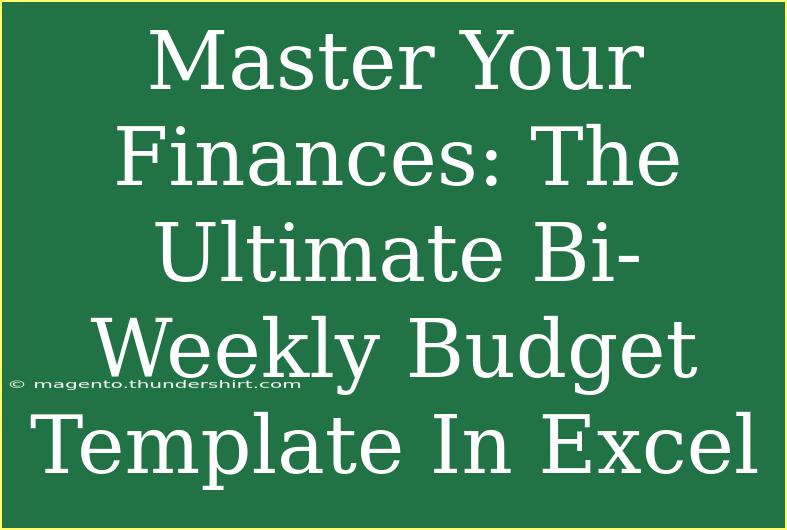Creating and managing a budget can feel overwhelming, but mastering your finances with a simple tool like an Excel bi-weekly budget template can make all the difference. 📊 Whether you're trying to save for a vacation, pay down debt, or simply get a clearer picture of your spending habits, a bi-weekly budget template helps you keep track of your income and expenses effectively.
Why Use a Bi-Weekly Budget?
For many of us, payday comes every two weeks, and expenses often follow suit. A bi-weekly budget allows you to align your financial planning with your pay schedule, making it easier to manage cash flow. Here's how it helps:
- Realistic planning: With a clear view of your finances every two weeks, you can adjust your spending in a timely manner.
- Better expense tracking: Instead of waiting until the end of the month, you can track your spending more frequently, allowing you to catch problems early.
- Simplifies savings: By allocating savings and expenses in a bi-weekly format, you can easily determine how much you can set aside.
Setting Up Your Bi-Weekly Budget Template in Excel
Creating your own bi-weekly budget template in Excel is simple and can be customized to fit your unique needs. Here’s a step-by-step guide on how to do it:
-
Open Excel: Launch Microsoft Excel and create a new spreadsheet.
-
Set Up Columns: Label the first row with the following headers:
- Date
- Description
- Income
- Expenses
- Category
- Balance
-
Enter Your Income: Start by filling in your income sources. For example, you can list your salary, freelance earnings, or any other income.
-
Track Your Expenses: As you go through your pay period, record your expenses in the corresponding columns. It’s helpful to categorize these expenses (e.g., groceries, utilities, entertainment) for better tracking.
-
Calculate Balance: In the Balance column, use the formula =C2-D2 (where C is Income and D is Expenses) to keep track of how much you have left after expenses. You can drag the formula down to apply it to the other rows.
-
Review Regularly: Make it a habit to review your budget template regularly. This helps you stay on track and make adjustments as necessary.
Here's a sample table layout of how your budget might look:
<table>
<tr>
<th>Date</th>
<th>Description</th>
<th>Income</th>
<th>Expenses</th>
<th>Category</th>
<th>Balance</th>
</tr>
<tr>
<td>01/01/2023</td>
<td>Paycheck</td>
<td>$2000</td>
<td></td>
<td></td>
<td>$2000</td>
</tr>
<tr>
<td>01/02/2023</td>
<td>Groceries</td>
<td></td>
<td>$150</td>
<td>Food</td>
<td>$1850</td>
</tr>
<tr>
<td>01/03/2023</td>
<td>Utilities</td>
<td></td>
<td>$100</td>
<td>Bills</td>
<td>$1750</td>
</tr>
</table>
<p class="pro-note">Pro Tip: Add color coding for categories to make your budget visually appealing and easier to navigate!</p>
Tips for Effective Budgeting
While creating a budget is essential, sticking to it is where many struggle. Here are some helpful tips to make your budgeting journey smoother:
- Be realistic: Make sure your budget reflects your true spending habits. If you know you love dining out, allocate funds for it instead of cutting it out completely.
- Adjust as needed: Life changes, and so should your budget. If you find yourself consistently over or under budget in certain areas, make adjustments accordingly.
- Use tools and apps: Consider integrating budgeting apps with your Excel template for a more comprehensive overview.
Common Mistakes to Avoid
Even with the best intentions, it's easy to fall into budgeting traps. Here are a few common mistakes to steer clear of:
- Underestimating expenses: Failing to account for occasional expenses (like insurance, gifts, etc.) can leave your budget unbalanced.
- Not tracking all transactions: It’s crucial to log every expense, no matter how small. Ignoring little costs can add up over time.
- Setting unrealistic goals: Keep your financial goals achievable. While it’s great to strive for savings, overly ambitious targets can lead to frustration.
Troubleshooting Budget Issues
Sometimes, your budget may not align as expected. Here’s how to troubleshoot:
- Revisit assumptions: Check whether your income and expense estimates are accurate. Life changes can impact both.
- Analyze spending habits: Look back at your past spending and adjust your budget categories based on actual spending patterns.
- Engage with a financial advisor: If you’re struggling, consider reaching out to a professional for personalized advice.
<div class="faq-section">
<div class="faq-container">
<h2>Frequently Asked Questions</h2>
<div class="faq-item">
<div class="faq-question">
<h3>What is a bi-weekly budget?</h3>
<span class="faq-toggle">+</span>
</div>
<div class="faq-answer">
<p>A bi-weekly budget is a financial plan that tracks income and expenses over two-week periods, allowing for more accurate cash flow management.</p>
</div>
</div>
<div class="faq-item">
<div class="faq-question">
<h3>How do I make adjustments to my budget?</h3>
<span class="faq-toggle">+</span>
</div>
<div class="faq-answer">
<p>You can adjust your budget by analyzing your past spending, removing unnecessary expenses, or increasing your savings targets based on your financial goals.</p>
</div>
</div>
<div class="faq-item">
<div class="faq-question">
<h3>What if I overspend in one category?</h3>
<span class="faq-toggle">+</span>
</div>
<div class="faq-answer">
<p>If you overspend, evaluate which expenses were unplanned. Adjust your budget for the next period, and try to reduce spending in other areas to compensate.</p>
</div>
</div>
<div class="faq-item">
<div class="faq-question">
<h3>How can I improve my budgeting skills?</h3>
<span class="faq-toggle">+</span>
</div>
<div class="faq-answer">
<p>Practice is key! Regularly review your budget, experiment with different categories, and use budgeting tools to enhance your skills.</p>
</div>
</div>
</div>
</div>
Mastering your finances doesn't have to be daunting. With your bi-weekly budget template set up in Excel, you can take control of your financial health, ensuring that you are both aware of your spending and actively working towards your financial goals. As you get into the rhythm of budgeting, you'll find that it empowers you to make smarter decisions, ultimately leading to financial freedom.
<p class="pro-note">💡 Pro Tip: Explore additional resources and tutorials to further your financial literacy and budgeting skills!</p>
